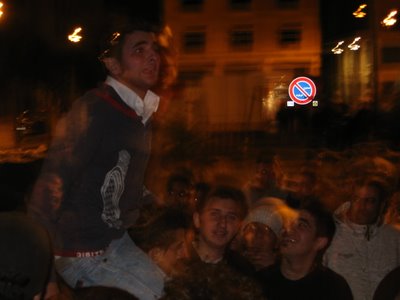
For three decades, a fleet of mid-1970s Dodge Coronets has plied the taxi routes between Damascus and Beirut and Damascus and Amman. Long and expansive, while retaining the muscle-car styling of its origins, the four-door Coronet comfortably carries five passengers -- two on the bench in front next to the driver and three across the back -- for $10 a person. The twin round headlights, roaring engine and ever-forgiving shocks conjure carpools of years past.
The system of acquiring passengers at the parking lot terminals in Damascus and Beirut is a delicate art that often escalates into fighting matches and occasionally fisticuffs.
This is the Coronet I took on Friday from Damascus to Beirut. The driver averaged 120 miles an hour on the gradual rise to the Syrian-Lebanese border -- if the speedometer was to be trusted. (These Coronets, unlike American car brands imported to the Middle East today, register only miles, not kilometers, per hour. Often, as on the ride back yesterday, the needle was missing all together.) The driver settled for about 100 miles an hour on the Lebanese side, as the curves and traffic can, thankfully, limit speeds. Passing on the wrong side of the yellow line on blind mountain curves is another skill entirely.
Passengers are typically strangers, usually from various Arab countries. They strike up interesting, even if predictable, conversations, almost always turning to politics: American imperialism is a favorite topic, as well as intra-Arab rivalries. On the ride back yesterday, a young Lebanese man in the front seat -- with a newly minted master's degree in Middle Eastern Studies from the American University in Beirut -- agreed with a Syrian man and woman in the back seat, sitting on either side of me, that Sykes-Picot, the British-French agreement that carved up the Levant after World War I, is their scourge and that they are really one people. In the next breath they drew sharply critical distinctions between each other and their countries: Syria's socialist economy, Lebanon's free market economy; Syria's large middle class, Lebanon's widening gap between rich and poor; Syria's wheat production; Lebanon's banking; Syria's meddling in Lebanese affairs, Lebanon's feudal politics masquerading as Democracy.
At the end of the ride, the driver thanked God for our safe arrival; the passengers asked God's blessings for the driver, they fetched their baggage from the Coronet's roomy trunk and paid the fare in any one of three currencies (American dollars are always accepted), then quickly bade each other farewell.
 In the middle class Christian neighborhood of Qasaa, not far from where I live, the spirit of Christmas, or at least the spirit of putting up gaudy Christmas light displays, is alive and well.
In the middle class Christian neighborhood of Qasaa, not far from where I live, the spirit of Christmas, or at least the spirit of putting up gaudy Christmas light displays, is alive and well.






